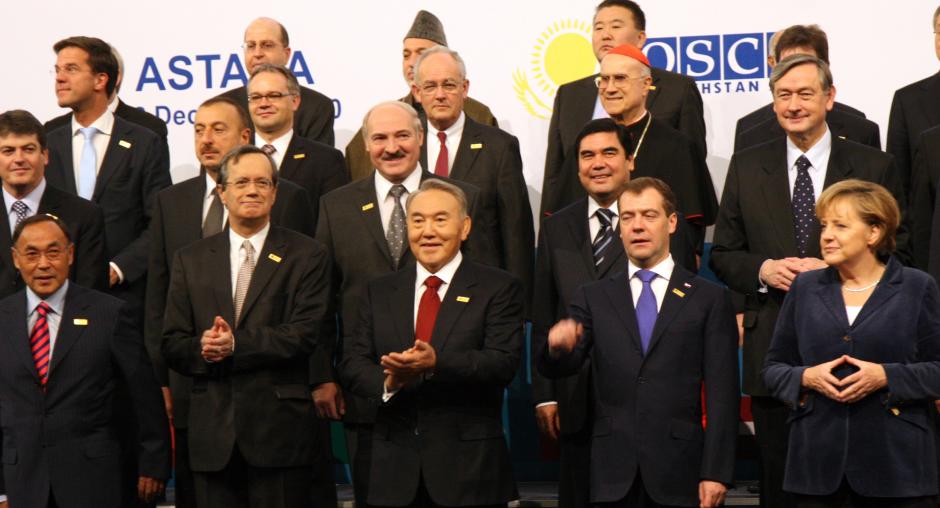OSCE Summit in Astana begins with call to Heads of State to advance Euro-Atlantic and Eurasian security

ASTANA, 1 December 2010 - The President of Kazakhstan, Nursultan Nazarbayev, opened today in Astana the first OSCE Summit in 11 years, calling the gathering a "triumph of common sense" and urging the Heads of State and Government from the 56 OSCE participating States to "advance together towards a secure future for our peoples".
"This journey was started three and a half decades ago," said President Nazarbayev in his opening address. "Initially, the Helsinki process had been developed on the concept of a common European home 'stretching from the Atlantic to the Urals'. With the establishment of the OSCE, the principles of European security were entrenched in the space 'from Vancouver to Vladivostok'. Now begins the third stage."
"The Summit for the first time takes place in a new country, which became independent in large part due to the principles of the Helsinki Final Act," he added. "The uniqueness of our Summit lies in the fact that it is taking place in the heart of Eurasia, a thousand miles from the geographical boundaries of Europe. This above all reflects the changed paradigm of European security."
"Eurasian security is not a metaphor, it is a strict geopolitical fact. Therefore, the Summit in Astana is a good opportunity to analyse the OSCE's prospects in global security. In our view, the main task of the OSCE in the coming decades is to resolve contradictions consistently and to strengthen trust and integration, including through the framework of existing inter-state structures."
The OSCE Chairperson-in-Office, Kazakhstan's Secretary of State and Foreign Minister Kanat Saudabayev, urged the participating States to "show the wisdom and courage of true leaders and reach consensus on the important issue of strengthening security and co-operation".
"It would be a first step in implementing Kazakhstan's initiative to create a Euro-Atlantic and Eurasian community of common and indivisible security. Such a result of the Astana Summit would meet the hopes of our peoples for a safer and better world," he said.
UN Secretary-General Ban Ki-moon said that Kazakhstan, as the first CIS and Central Asian country to head the OSCE, had helped to guide the way to a "new era of action and engagement", and commended the high level of co-operation to be found in the OSCE area.
"Not so long ago, few would have imagined the peoples of this vast area would be bound so closely together," he said. "In the process, the challenges have become more apparent. But so, too, have the impressive common achievements and enormous new horizons of change and opportunity."
The President of the OSCE Parliamentary Assembly, Petros Efthymiou, emphasized the importance of agreement at the Summit: "There is no doubt how much lies at stake here in Astana - and we don't have the luxury to let it fail."
"It is clear that the process of revitalizing our Organization has only started - and the challenge at hand is analogous to the birth of our Organization, back in the 1970s."
OSCE Secretary General Marc Perrin de Brichambaut, addressing the Heads of State, underscored the need for addressing all dimensions of the OSCE's comprehensive security concept in the discussions: "I urge you to use this historic opportunity to give a fresh start to arms control discussions, improve early warning and confidence-building measures, bolster efforts to resolve protracted conflicts, work together to tackle transnational threats, and enhance co-operation in addressing economic and environmental challenges. All of these efforts will benefit from and be supported by your unwavering adherence to our agreed commitments in the human dimension."
The Astana Summit brings together 38 Heads of State and Government, one Vice President, seven Deputy Prime Ministers, 14 Ministers and other top officials from OSCE participating States and Partners for Co-operation, as well as from other international and regional organizations. The Summit is the OSCE's first since the Istanbul Summit in 1999.
Plenary sessions will continue until 2 December. A news conference by President Nazarbayev will follow the closing session of the Summit.
